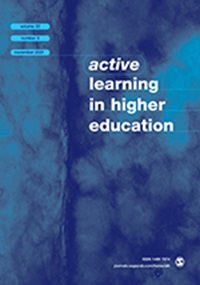大学生使用社交媒体的情况:探索身份发展、学习支持和平行使用
IF 3.8
1区 教育学
Q1 EDUCATION & EDUCATIONAL RESEARCH
引用次数: 0
摘要
社交媒体对大学生的日常生活影响很大。社交媒体是否也会在上课时发挥作用,是一个值得深入研究的问题。这项探索性研究旨在设计一个包含这些概念的理论模型。首先,我们确定身份发展、学习支持和平行使用是上课时相关的一般概念。接着,我们对 230 名学生进行了调查,研究这些一般概念是否可以通过因子分析和相关分析进行实证验证。然后,我们运用文献综述来确定更具体的概念,并将其从属于这些一般概念。由此得出的上课时使用社交媒体的模型包括主动和被动要素,涉及设计和注册个人信息、给予和获得学习支持,以及并行使用期间的发布和浏览。我们得出了三个结论:(1) 身份发展基于印象管理、社会比较和自我概念澄清;(2) 学习支持包括协作学习、支持内在动力和促进自我效能;(3) 学习期间的并行使用基于娱乐、逃避现实和放松。最后,我们讨论了我们概念模型的局限性,特别是缺少模型测试、未来研究活动和实际意义。本文章由计算机程序翻译,如有差异,请以英文原文为准。
The social media use of college students: Exploring identity development, learning support, and parallel use
Social media has a strong influence on the everyday lives of college students. A particular question of advanced research interest is whether social media also play a role when attending class. This exploratory study was aimed at designing a theoretical model that embraces such concepts. First, we identified that identity development, learning support, and parallel use are general concepts that are relevant when attending class. Next, using a survey with 230 students, we examined whether these general concepts could be empirically validated with factor and correlation analyses. We then applied a literature review to identify and subordinate more specific concepts to these general concepts. The resulting model of social media use when attending class includes active and passive elements related to designing and registering personal information, giving and getting support for learning, as well as posting and browsing during parallel use. We offer three conclusions: (1) identity development is based on impression management, social comparison, and self-concept clarifying, (2) learning support consists of collaborative learning, supporting intrinsic motivation, and promoting self-efficacy, and (3) parallel use during learning is based on entertainment, escapism, and relaxation. Finally, we discuss limitations, especially missing model tests, future research activities, and practical implications of our conceptual model.
求助全文
通过发布文献求助,成功后即可免费获取论文全文。
去求助
来源期刊

Active Learning in Higher Education
EDUCATION & EDUCATIONAL RESEARCH-
CiteScore
13.20
自引率
12.00%
发文量
31
期刊介绍:
Active Learning in Higher Education is an international, refereed publication for all those who teach and support learning in higher education (HE) and those who undertake or use research into effective learning, teaching and assessment in universities and colleges. The journal is devoted to publishing accounts of research covering all aspects of learning and teaching concerning adults in higher education. Non-discipline specific and non-context/country specific in nature, it comprises accounts of research across all areas of the curriculum; accounts which are relevant to faculty and others involved in learning and teaching in all disciplines, in all countries.
 求助内容:
求助内容: 应助结果提醒方式:
应助结果提醒方式:


